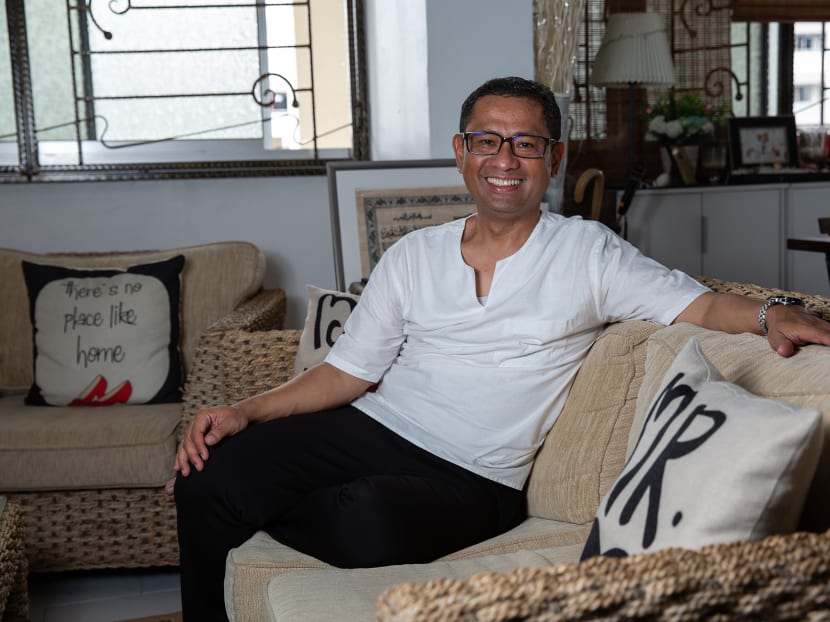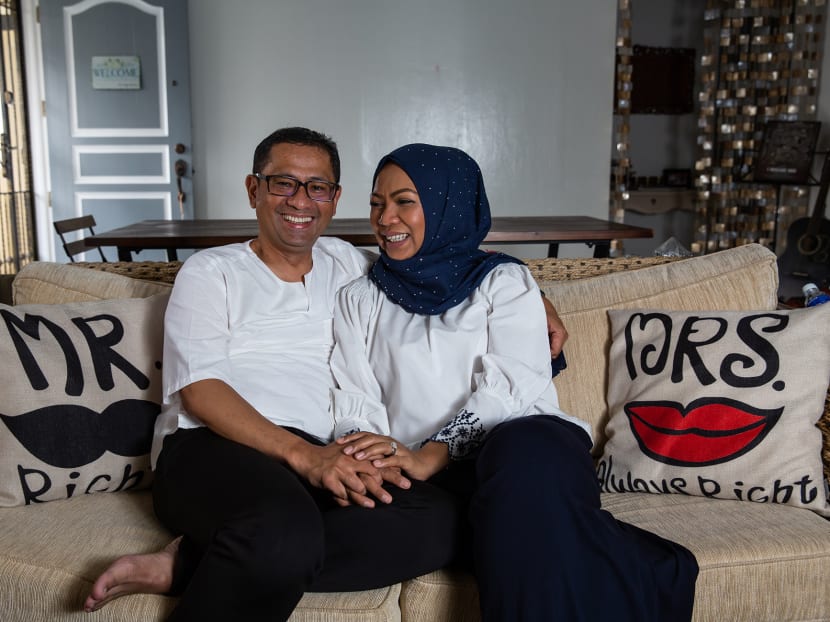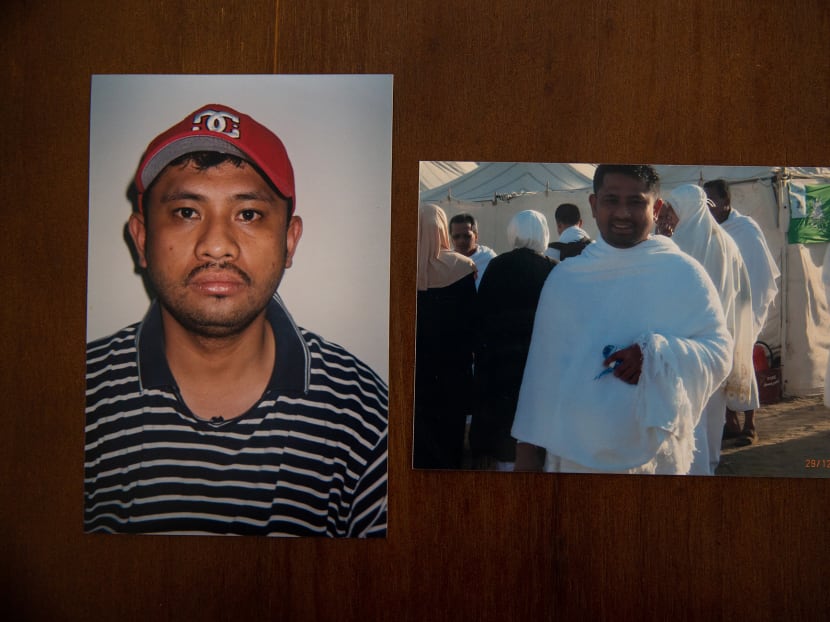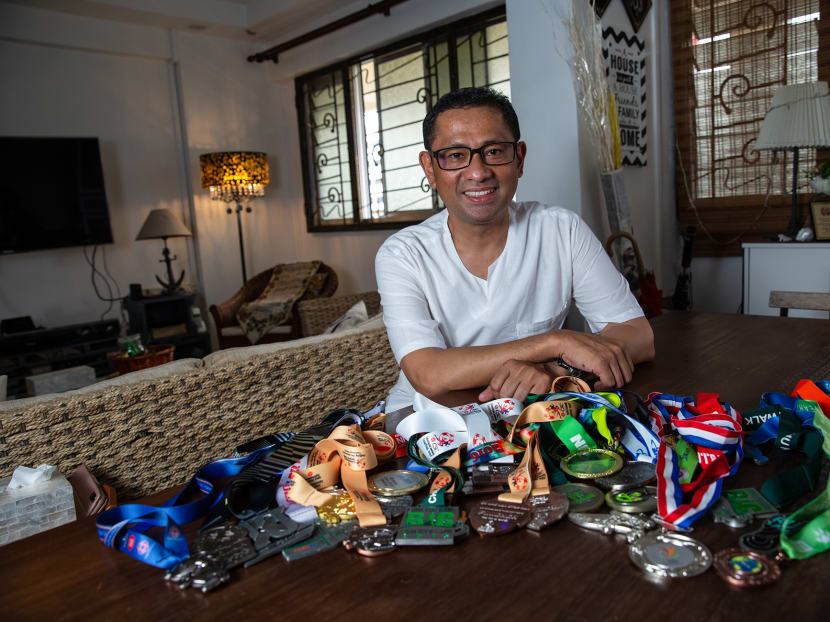He was all prepared for death. Then, this liver cancer patient lucked out
SINGAPORE — With 58 people on the waiting list for a liver transplant last year, Mr Sani Tugiman, 49, was not certain if he could survive the wait.

Mr Sani Tugiman, a 49-year-old liver cancer survivor who waited 4.5 long years before he got a deceased donor liver transplant.
SINGAPORE — With 58 people on the waiting list for a liver transplant last year, Mr Sani Tugiman, 49, was not certain if he could survive until it was his turn.
Following a liver cancer diagnosis in 2014, he had waited more than four years for a cadaveric donor liver.
The cancerous tumour had been removed, but his liver had already been irreparably damaged by decades of chronic Hepatitis B, which he acquired at birth.
“My liver was in such a bad shape, I was told I could only live three to five years without a transplant. Every day that I waited was a gamble,” he said.
With no life-saving transplant in sight, Mr Sani had his death all planned out.
“I put together a large bag of items needed for a Muslim funeral, as well as a list of contacts for my next-of-kin to get in touch with after I die. I’ve seen many people who pass on and were not prepared,” he said.
He lucked out in June last year. Just nine days before Hari Raya, Mr Sani’s long wait ended.
He underwent a successful transplant surgery at the National University Hospital (NUH). “The day I had a new liver, I knew I had a new lease of life,” he said.

Liver cancer patients like Mr Sani make up almost half of those on the liver transplant wait list at NUH’s National University Centre for Organ Transplantation (NUCOT), which carries out about 60 per cent of liver transplants in Singapore.
The fourth-most common cancer in men here, most liver cancers are preventable. In Singapore, the main causes are Hepatitis B and C infection, and alcoholic liver disease, said Dr Tan Poh Seng, senior consultant (liver transplantation) at NUH’s NUCOT.
Most people with this cancer also have liver damage and hardening, he said.
In recent years, non-alcoholic fatty liver disease has been on the rise and could become a major liver cancer cause in future, Dr Tan added.
TRANSPLANTS SUITABLE FOR SOME PATIENTS
Liver transplantation is a means to cure liver cancer but it is only suitable for some patients. It depends on the cancer factors and the patient’s underlying liver function, said Dr Tan.
“A liver transplantation is generally considered for patients with early-stage liver cancer but with poor liver function. If a patient has very poor liver function, he or she is unlikely to tolerate most cancer treatments and liver transplantation is usually the only chance to cure the liver cancer,” he said.
“This is possible as during the transplant surgery, the patient’s own damaged liver as well as the liver cancer are removed completely and replaced by a healthy liver.”
The patient’s age (usually under 70 years old), overall fitness and severity of other medical conditions are also considered when assessing if he or she is suitable for a liver transplant.
LONG WAIT FOR A DONOR
Cadaveric donor organs are hard to come by in Singapore.
For liver cancer patients, the wait for a liver from a deceased donor can be up to five years. The average is around one-and-a-half years, said Dr Tan.
Not all patients can wait that long. In the last five years, about 30 per cent of liver patients were deemed unsuitable for a liver transplant and dropped out of the waiting list, according to NUH’s figures.
This could be due to the risk of liver cancer progressing and spreading to a stage whereby liver transplantation is no longer possible, said Dr Tan.

“Hence, if there are suitable living donors, liver transplantation for patients with liver cancer can be carried out as an elective surgery at an earlier date to avoid the risk of cancer spreading while waiting for a deceased donor,” he said.
Patients without suitable living donors would often undergo bridging treatment to control or slow the growth of the liver cancer while waiting, said Dr Tan.
Mr Sani was not suitable for a living donor transplant as his condition required a whole liver transplant.
Other treatment options for liver cancer include surgery to remove a portion of the liver, thermal ablation – which uses heat to destroy liver tumours without removing them – as well as intra-arterial therapy and systemic therapy.
The latter two treatments are not curative but are used to control the growth and spread of the cancer for some time, said Dr Tan.
GIVING UP ROTI PRATA AND FRIED CHICKEN
Even as he readied himself for death, Mr Sani’s survival instincts kicked in and he overhauled his lifestyle.
Previously severely overweight, Mr Sani – who was once known as Sani buncit (“big stomach” in Malay) – shed 20 kg after embarking on a strict exercise regimen and diet.
“My stomach used to burst out of my work shirts and I never, ever took my health seriously. But when I realised how bad things were after seeing a video (recording) of my liver, which was covered with nodules, I told myself things had to change. I want to see my kids grow up and get married,” said Mr Sani, who has three children aged 10, 15 and 16 from his first marriage.
Starting with daily brisk walks around his neighbourhood, Mr Sani’s fitness levels gradually improved. Since embarking on a healthier lifestyle, he has participated in over 20 running events and marathons.
The weight loss spurred him to change his unhealthy diet. He gave up his favourite roti prata, nasi biryani and ayam goreng (fried chicken) for healthier home-cooked food and soups.
Mr Sani continued staying active until his transplant procedure. In fact, he requested to get up and walk two days after the major operation, said his wife Aisha Manan, 46.

“He asked to go for a walk while he was still in intensive care. You should see the shocked look on the nurses’ faces. They were so stressed out (by his request), and so was I,” said Mdm Aisha with a laugh.
Despite Mr Sani’s ill health, Mdm Aisha, who works in the retail sector, decided she wanted to be there for him during his transplant journey. They got married a few months before he received news of a successful liver match.
Mr Sani suffered a setback shortly after the surgery and was diagnosed with cytomegalovirus infection, a complication that may occur after an organ transplantation.
The survivor bounced back again. Looking back, Mr Sani thinks that his improved fitness, together with support from his wife and family, helped him to survive the long wait and recover better after the surgery.
He hopes to encourage other patients on the organ transplant waiting list to not give up and to have a positive mindset despite their ill health.
“I want to tell other patients to continue to live healthily and exercise while they are waiting. As liver patients, we take a lot of medications and there may be side effects. I feel that exercise is the only way to balance it,” he said.
In February, eight months after his transplant, Mr Sani participated in the Singapore Transplant Games. He bagged the champion’s medal for the 1,500-metre race walk and was first runner-up in the 3,000-metre race walk.
Grateful to be alive, Mr Sani continues to remain active and eat healthily. “I intend to take good care of this new liver,” he said.
As for the big bag of essential items he prepared for his own funeral, Mr Sani thinks he will not be needing it anytime soon.
“Every year, I end up giving some items to someone else. Recently, I gave away some stuff from my bag. But this time, I’ve not refilled it,” he said with a smile.
NEW CLINIC OPENING
The new clinic of the National University Hospital’s (NUH) National University Centre for Organ Transplantation opens next month. An art exhibition will be held from now to June 14 (9am to 8pm) to showcase the top 24 art pieces from the Live On Design Competition, organised last year by the National Organ Transplant Unit.
Two books documenting the experiences of organ transplant patients, Mr Aaron Tay and Ms Nicole Lim, will be on sale from 10am to 4pm at the centre’s official opening on June 14.
Titled Strength in Adversity and How to be a Good Patient, they cost S$20 each and sale proceeds will go to the NUHS Fund Limited to support financially-needy organ transplant patients.
The art exhibition and book sale will take place at NUH Main Building, Lobby B.
POTENTIAL TREATMENT FOR FATTY LIVER DISEASE
Researchers in Singapore have found a potential treatment for fatty liver disease, and hope to have drugs ready for clinical trials by the end of next year.
Fatty liver disease is very common in Singapore and affects about one in four people in the world. People with diabetes and obesity are particularly at risk, but there is currently no treatment for fatty liver disease.
The team – led by Duke-NUS Medical School and the National Heart Centre Singapore – found that a protein called interleukin 11 (IL11) triggers the development of an untreatable type of fatty liver disease called non-alcoholic steatohepatitis (Nash).
About 20 per cent of fatty liver cases progress to Nash, where fat accumulates in the liver and the organ becomes inflamed and its cells, damaged.
The researchers found that de-activating IL11 with drugs – called therapeutic antibodies – reverses inflammation and scarring of the liver in Nash patients.
Their findings were published this month in the journal Gastroenterology.
The researchers tested the drugs on mice and found that they prevented and reversed liver inflammation, and even led to lower levels of cholesterol and glucose in the blood.
A biotechnology company called Enleofen Bio aims to have the drugs ready for clinical trials on humans by the end of next year.
Enleofen Bio’s co-founder, Professor Stuart Cook, was one of the authors of the study.
Professor Cook is also a senior consultant at the National Heart Centre Singapore and director of Duke-NUS’ Cardiovascular and Metabolic Disorders programme.









